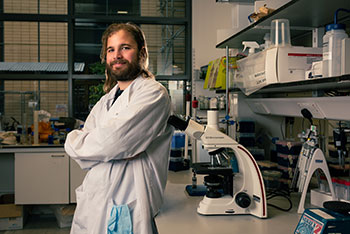Research fellowship to explore tuberculosis treatments
Pioneering research at the University of York could help us understand how the latest new antibiotics against tuberculosis (TB) work - and pave the way for improved treatments in the future.

Dr Jamie Blaza, from York’s Department of Chemistry, has been awarded a Future Leaders Fellowship from UK Research and Innovation (UKRI) to study the role of newly developed antibiotics in tackling the infection.
Advanced
Dr Blaza and his team will use advanced biophysical methods to measure the energy flow in living bacterial cells and how these parameters change in response to antibiotics.
He will combine these measurements with high-resolution imaging of key bioenergetic enzymes using an advanced electron microscope. This new cutting-edge instrument will be installed in the Eleanor and Guy Dodson Building, a new facility currently under construction as part of the York Structural Biology Laboratory in the Department of Chemistry.
The fellowship project will run for four years, with the possibility of a three-year extension.
“For the first time, a number of biophysical techniques will be brought together to allow us to measure key cellular molecules without needing to break open or disrupt the bacteria,” said Dr Blaza.
Unique
“The research will give us a unique window into the workings of the bacterial cells. Once we have that understanding in untreated bacteria, we will add clinical antibiotics to observe how different drugs work to disrupt the cell. By clarifying their mechanism of action, we should be able to offer insights into how to make more effective antibiotics to tackle TB.”
TB is one of the top ten causes of death worldwide - in 2017, 10m people developed the disease causing 1.6m deaths. It is caused by the infectious mycobacterium Mycobacterium tuberculosis and current treatment strategies rely on a combination of drugs over an extended period with unpleasant and damaging side-effects.
Antibiotic-resistance is threatening the effectiveness of these treatments.
Dr Blaza said: “The challenge is to develop drugs that remain effective and have fewer side effects. By understanding the complicated interactions between tuberculosis biology and antibiotics we aim to aid the development of new compounds.”
Understanding
Professor Duncan Bruce, Head of the Department of Chemistry, said: “I am delighted that Jamie has been awarded this fellowship. His understanding of the biochemical pathways combined with the insight he will gain from the use of the new electron microscope promise to provide a unique insight into this awful disease.”
The Future Leaders Fellowships scheme helps universities and businesses in the UK recruit, develop and retain the world’s best researchers and innovators, regardless of their background. They can apply for up to £1.5m to support the research and innovation leaders of the future, keeping the UK at the cutting edge of innovation.
Announcing the awards today, UK Science Minister Amanda Solloway said: “We are committed to building back better through research and innovation, and supporting our science superstars in every corner of the UK.
“By backing these inspirational Future Leaders Fellows, we will ensure that their brilliant ideas can be transferred straight from the lab into vital everyday products and services that will help to change all our lives for the better.”